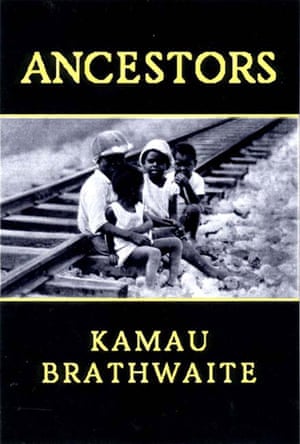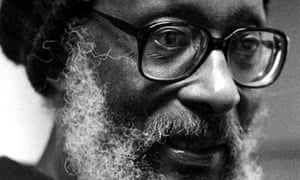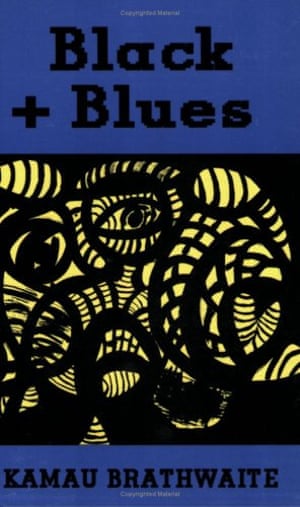Edward Kamau Brathwaite obituary
Poet and academic who aimed to create a distinctively Caribbean form of poetry to celebrate the region’s voices and language
Edward Brathwaite, also known as Kamau Brathwaite, who has died aged 89, was a Caribbean poet and historian, praised by the American poet Adrienne Rich for his “dazzling inventive language, his tragic yet unquenchable vision, [which] made him one of the most compelling of late twentieth century poets”.
Brathwaite began composing and performing his best-known work, The Arrivants: A New World Trilogy (1973), while teaching and studying history in Jamaica and Britain in the 1960s. This epic trilogy traces the migrations of African peoples in and from the African continent, through the sufferings of the Middle Passage and slavery, and dramatises 20th-century journeys to the UK, France and the US in search of economic and psychic survival.
The Arrivants exemplified Brathwaite’s ambition to create a distinctively Caribbean form of poetry, which would celebrate Caribbean voices and language, as well as African and Caribbean rhythms evoking Ghanaian talking drums, calypso, reggae, jazz and blues. Brathwaite argued that the iambic pentameter embodied the British language and environment; it was not a meter that could carry the experience of hurricanes, slavery and a submerged African culture.
In his History of the Voice: The Development of Nation Language in Anglophone Caribbean Poetry (1984), Brathwaite contended that the English language spoken by the descendants of slaves in the Caribbean carried a suppressed African identity that surfaces in the way words are voiced and also in particular words, idioms and syntactical formations, such as “nam” for “to eat”, “i and i” for “we”, and “What it mean?” for “What does it mean?”.
His use of reggae rhythm and Rastafarian voice and idiom can be heard in Rights of Passage (originally published in 1967), the first book in The Arrivants trilogy:
Rise rise
locks-
man, rise
rise rise
leh we
laugh
dem, mock
dem, stop
dem, kill
dem, an go’
back back
to the black
man lan’
back back
to Af-
rica.
For Brathwaite, oral performance and a listening community were vital. Moreover, he insisted, the language spoken by Caribbean peoples should be regarded not as a dialect, or subsidiary and inferior form of English, but as a “nation language”, capable of expressing the complexities of Caribbean culture and history.
In later years, Brathwaite deployed a concept he termed “tide-alectic” or “tidalectic”, which he described as “the ripple and the two tide movement”. The term embodied his affirmation of a specific language and way of perceiving the world that rejected an analysis based in thesis, antithesis and synthesis, “the notion of dialectic, which is three – the resolution in the third”. It also connoted Brathwaite’s concern to move towards a sense of identity and continuity across oceans, rather than an identity grounded in one place or time.
After the 80s, Brathwaite’s publications featured his increasing interest in the use of different computer fonts and spacings to create strong visual effects on the page. He termed this form of concrete poetry Sycorax video style, and spoke of Sycorax (the silenced mother of Caliban) as the ghost who inhabited his machine. And whereas his early trilogies sought to express a collective Caribbean experience and identity, the later works became increasingly autobiographical, suggesting his own experience could be read as representative of contemporary African-Caribbean history.
Brathwaite’s concentration on the African elements of Caribbean poetry and history differentiated him from other major Caribbean writers such as VS Naipaul, who focused on Indians who had been transplanted to the New World, and Derek Walcott, who claimed English literature (including the iambic pentameter) as equally part of his heritage.
It was a differentiation that at times became exaggerated and embroiled in the cultural and racial politics of the Caribbean islands. Brathwaite was a resolute nationalist: a sequel to The Arrivants is titled Mother Poem (1977), and declares Barbados as his motherland in opposition to England’s self definition as mother country to all her colonies.
Yet Brathwaite also expressed his debt to TS Eliot, noting that “what TS Eliot did for Caribbean poetry and Caribbean literature was to introduce the notion of the speaking voice, the conversational tone”. Like Eliot’s The Waste Land, The Arrivants seeks to express the quest of a whole society for spiritual healing through the deployment of a variety of voices, invoking past and present memories and loss, and continuing imagery of desert and water, sterility and fertility, within that quest.
Born Lawson Edward Brathwaite in Bridgetown, Barbados, he was the son of Hilton, a warehouse clerk, and Beryl (nee Gill), a talented pianist and one of the first black women to be employed as a clerk in Bridgetown. Edward attended Harrison college in the capital and was awarded a scholarship to Pembroke College, Cambridge, graduating in history in 1953 and gaining a diploma in education the following year. At Cambridge he also attended lectures by FR Leavis and became acquainted with his fellow Pembroke student and poet Ted Hughes.

His appointment in 1955 as an education officer in what was then the Gold Coast saw Brathwaite witness Kwame Nkrumah coming to power and Ghana becoming the first African state to gain independence, which profoundly affected his sense of Caribbean culture and identity. There he also studied with the musicologist JH Nketia.
In 1960 Brathwaite married Doris Welcome, a teacher and librarian originally from Guyana. Together they started a children’s theatre in Ghana, for which he wrote several plays. From 1962 he took up teaching posts for the University of the West Indies (UWI), first in St Lucia, then in Kingston, Jamaica. Here he began writing Rights of Passage, and also published poems in the Caribbean literary journal Bim.
He began a PhD at the University of Sussex in 1965, with his dissertation published on The Development of Creole Society in Jamaica, 1770-1820 (1971). In London he met other Caribbean intellectuals and artists, such as John La Rose, Andrew Salkey, Wilson Harris, Aubrey Williams and Stuart Hall, and became co-founder of the Caribbean Artists Movement, which met regularly in London and at the University of Kent between 1966 and 1972.
Returning to Jamaica, Brathwaite launched a journal of the movement, Savacou, in 1971. Awarded a fellowship to the University of Nairobi that same year, Brathwaite met the Kenyan writer Ngũgĩ wa Thiong’o, whose grandmother encouraged Brathwaite to take Kamau as his first name.
From 1982 to 1991 Brathwaite was professor of social and cultural history at the UWI. When Doris was diagnosed with cancer he began writing The Zea Mexican Diary (1993) as a tribute to her, “the perfect wife of/for the poet”. She died in 1986.
Made professor of comparative literature at New York University in 1992, Brathwaite subsequently lived in New York and Barbados. He served on the board of directors of Unesco’s History of Mankind project for more than 30 years. He was awarded the Neustadt international prize for literature in 1994. Other awards included the Griffin international poetry prize for his collection Born to Slow Horses (2006), the Bussa award, the Casa de las Américas prize, and the PEN/Voelcker award for poetry in 2018.
The scholar Louis James wrote of Brathwaite: “His passionate engagement with the culture of the common people in the Caribbean has had a liberating impact on postcolonial writers across the wider spectrum, freeing them to explore their experience in language and forms authentically their own.”
In 1998 Brathwaite married Beverly Reid. She survives him, along with his son with Doris, Michael, his granddaughter, Ayisha, and a sister, Joan.
• Edward Kamau Brathwaite, poet and historian, born 11 May 1930; died 4 February 2020





HOW I GOT MY EX HUSBAND BACK WITH THE HELP OF DR AGBAKA
ReplyDeleteI will forever be indebted to the great Doctor Agbaka for fixing my broken marriage after my husband left me for his mistress for 6 months. I never believed in spells until my friend introduced me to him. At first, I was skeptical about him because I heard a lots about false spell casters but I put my doubts behind me for i was desperate to get my husband back and I did according to what he instructed me to do. Now my husband is back just within 48 hours of contacting him. I'm living happily with my husband again after 6 months of divorce and I will not rest till he's known all over the world. He's also specialize in money spells, lottery spells, sickness curing E.T.C. Get connected with Doctor Agbaka now, his email is Agbakaspelltemple @ gmail. com or WhatsApp on +2349052647861...